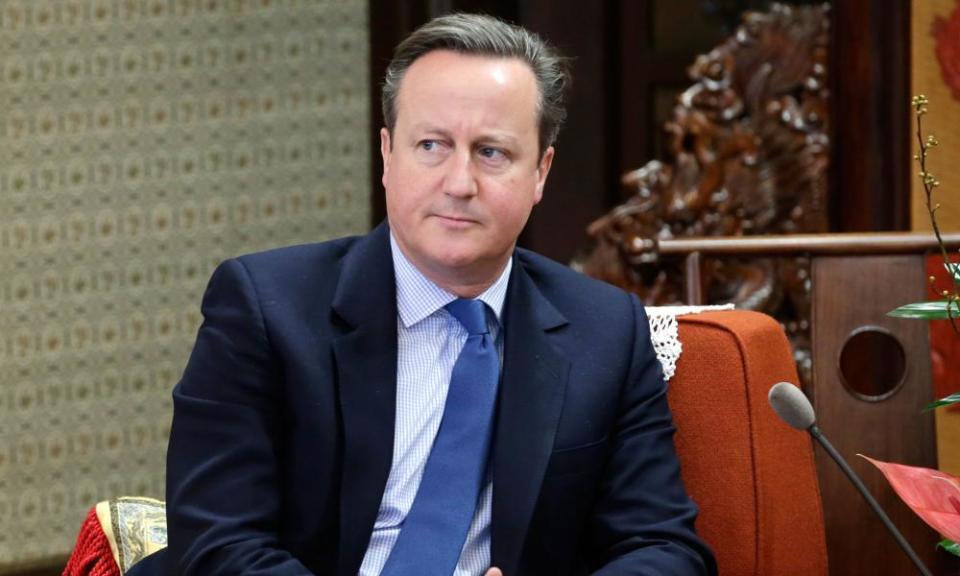Timeline: David Cameron and Greensill Capital

More than 30 days after David Cameron was first approached for comment over allegations that he had lobbied government ministers on behalf of the scandal-hit company Greensill Capital, he has broken his silence.
Greensill, which lent money to large businesses so that they could pay their suppliers, went into administration last month after insurers refused to renew contracts covering its loans. Here we look at the key moments in the saga.
2011
Greensill Capital is founded, with an initial focus on supply-chain finance. It will later diversify and launch conventional banking services through a German subsidiary, Greensill Bank.
According to Cameron’s latest statement, this same year the company’s founder, Lex Greensill, was brought in to work with the government by the then cabinet secretary, Jeremy Heywood.
2012
Lex Greensill offers advice to the Cameron government on a supply-chain finance initiative, with commitments from companies including construction group Carillion, which collapsed in 2018.
2014
The Cabinet Office recruits Lex Greensill as one of six new “crown representatives” to help tackle wasteful contracts and ensure that suppliers provide the best value for money.
Watch: The seven inquiries looking into government lobbying
24 June 2016
Cameron resigns as prime minister after losing the EU referendum.
2018
Cameron becomes an adviser to Greensill Capital and is given stock options in the company.
2 March 2021
Greensill Capital seeks insolvency protection in Australia and a rescue deal with new and existing backers, after two Swiss banks announce they are closing funds linked to the business over concerns about its true value.
Germany’s financial watchdog takes direct oversight of operations at the local subsidiary of the London-based lender.
4 March 2021
The FT reports that it has made repeated attempts to get a comment from Cameron regarding the company’s collapse and its ties to government.
8 March 2021
Greensill Capital files for administration.
12 March 2021
Liberty, the UK’s third-largest steelmaker, is forced to pause production at some of its UK plants to conserve cash as a result of Greensill’s collapse. Its parent company, GFG Alliance, employs about 5,000 people in the UK and was one of Greensill’s largest borrowers.
The first formal request for comment is submitted by the Guardian to Cameron’s office. He continues to ignore all requests from national media.
16 March 2021
It emerges that Cameron met an Australian insurance company employee who was dismissed over his alleged involvement in underwriting the controversial lending model at Greensill Capital.
19 March 2021
It is reported that Cameron lobbied senior government officials to give Greensill Capital special access to the largest available tranche of emergency Covid loans just months before the lender collapsed.
Nearly 450 job losses at Greensill Capital in London and Cheshire are announced.
21 March 2021
The Sunday Times reports that Cameron sent multiple texts to Rishi Sunak in April 2020 in the hope of gaining access to cheap, 100% government-backed loans through the Covid corporate financing facility (CCFF).
22 March 2021
The Conservative-dominated Treasury select committee declines to launch an inquiry into Cameron’s efforts to lobby government officials.
25 March 2021
It is reported that Cameron faces an investigation by the registrar of consultant lobbyists into a possible breach of lobbying law.
26 March 2021
British Business Bank launched an investigation into Greensill Capital and loans that it extended to Sanjeev Gupta’s steel empire months before its collapse, the Guardian learns.
The lobbying registrar clears Cameron, concluding that his activities had not met the criteria that required registration.
30 March 2021
A business card emerges that appeared to confirm that Lex Greensill had a role at the heart of Downing Street, prompting Labour to renew its calls for a full investigation into Cameron’s role.
4 April 2021
Labour calls for changes to lobbying law. The party says rules should be widened to include “in-house” roles such as Cameron’s for Greensill.
8 April 2021
The Treasury releases messages sent by Sunak to Cameron and says the former PM phoned junior ministers. In the messages, the chancellor tells Cameron he had “pushed the team” to find a way for Greensill to gain access to emergency Covid loans.
10 April 2021
It emerges that Cameron lobbied a senior Downing Street aide and Matt Hancock, the health secretary, on behalf of the company. Cameron also arranged a private drink with the health secretary and Greensill, it is revealed.
11 April 2021
Cameron finally breaks his silence, saying he worked within the rules but admitting that he had reflected on his conduct and that “important lessons” would be learned.
12 April 2021
No 10 launches an inquiry into Cameron’s lobbying for Greensill to be led by the legal expert Nigel Boardman.
Watch: Boris Johnson ‘agrees thoroughly’ with Lord Pickles

 Yahoo Movies
Yahoo Movies 